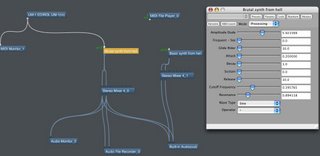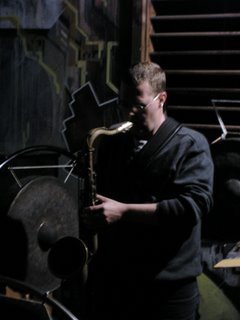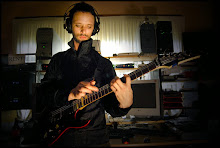Audio Arts 12-09-06
Audio Arts 12-09-06:
The sonic harmony of Hindmarsh, as experienced on a 90 second bike ride on Port rd from Kilkenny to Croydon, one sunny Sunday.
This is my visual analysis and there is a link below to download a word document of my written analysis table, which includes a short explanation of the not so self explanitory components of the visual diagram.
Port rd diagram (1.3MB jpeg)Analysis table.doc
Improvisation Workshop 14-09-06
Improvisation Workshop 14-09-06:

It wasn’t until I checked out Dr Sardeshmukh’s accolades on the web that I began to fully comprehend just how lucky we were to be granted such an intimate and informative workshop / performance with the man. If I had any reservations about where the workshop concept of the last two months was taking us, they were dashed onto the rocks of insignificance after this fantastic experience. I’ve had fleeting thoughts in the past about India seeming like an interesting place to visit. Now I really want to go.
Dr Sardeshmukh was the picture of focused intensity and spiritual humility, as he widdled around the neck of his sitar with virtuosic ease. He closed his eyes in some difficult sections to maintain concentration, and made eye contact with the audience during others, with the friendly smile of someone who is content, quietly confident, and doing what they love.
I listened carefully to his explanation of the improvisation process in Indian music, and in particular, found the concept of measuring the depth of a musician via his or her technical ability in combination with musicality to be very much in harmony with my personal view of musicianship. I know there are exceptions to the rule, but in my experience you rarely get much of one without the other. I believe the more you challenge yourself, and the more you strive for awareness regarding the possibilities of your chosen field, technically and musically, the more you will get out of it. Dr Sardeshmukh was a fine example of this.
I thought the improv’ group did a great job of complementing Dr Sardeshmukh’s playing. Vinny was great on the percussion (I would have lost count after the first bar of 7/8 – there’s a technical area I need to work on!). Tyrell came up with some brilliant sweeping frequency manipulation at times, Seb and Luke provided an interesting angle of tentatively ‘dirtying’ up the sound with some nicely distorted Juno vs Mac sample mashing, and Daniel and Poppy provided tasteful spatial sound effects and some brilliantly haunting vocal work.
It may be my easily distracted modern western attention span, but I felt that the jam reached a real high point at around the 20 – 25 minute mark and as a result could maybe have wrapped up five minutes or so earlier. I suspect that it was Dr Sardeshmukh sticking somewhat to the rules of Indian improvisation that dictated the timeframe though. All in all, it was a great Thursday afternoon. I hope my group has a similarly enlightening experience in week nine...
Dr Sardeshmukh – just getting warmed up (2.3MB Mp3)A taste of the full experience (4.0MB Mp3)Reference:
Dr. Chandrakant Sardeshmukh. “Improvisation Workshop”. (Workshop presented at EMU Space, 5th floor Schulz building, University of Adelaide). 14-09-2006
Creative Computing 07-09-06
Creative Computing 07-09-06:
Plogue Bidule – click go the binary shears….

Bidule grouping was an easy enough task to perform. The polyphonic adapter proved to be a little more elusive in displaying its core functionality. After numerous unsuccessful attempts to apply polyphony to a stochastic midi device or note extractor, I discovered that the group itself needs to be created and self contained first, then polyphony could be applied to the newly created synthesiser. Armed with my newfound satisfaction, I discovered a different source of frustration contained in Plogue’s audio output: rampant clicking, at every note on / note off (very annoying, listen to audio example for clarification). This still occurred, even after I followed the patch building pattern in chapter eight of the help manual to the letter, grrrrr!
Hopefully my audiwoes will be resolved with a simple solution on Thursday…
Listen ye! To the awful price……..of polyphony (170KB Mp3)Reference:
Christian Haines. ‘Plogue Bidule’. Lecture presented at the Audio Lab, 4th floor, Schulz building, University of Adelaide. 07/09/06.
Improvisation Workshop 07-09-06
Improvisation Workshop 07-09-06:
Derek Pascoe and the art of fighting:
I like Derek. He seems to be a quietly grounded person. It’s the same feeling I get from most (if not all) people who are satisfied with what they do and comfortable with who they are. His first spoken words, regarding the fact that he has never had to struggle with the torment of not knowing what he wants to do in life, could have been rightly delivered at a life coaching conference. I have known many people who don’t feel they know why they’re here. Some of these people would be grateful to be in Derek’s position right now I’m sure.

The approaches offered by Derek appear to be as open ended as one would like to make them. I think a long period of working in this area, and with other people who are interested in adhering to these loose guidelines may produce some remarkable results. Satisfaction from this approach (and this applies to all forms of group performance in some way) would begin to be attained at a stage when everyone in the group is used to one another, and comfortable with their position within the context. Today there was only one person who I felt was truly comfortable with his position, and that was Derek. Given time, I feel that the other musicians would become less hesitant to express themselves, and really start going for it, like Derek was at times.
It was clear from Derek’s confidence and his words on his own gruelling practice routine, that he has been exploring the potential of ‘free’ music and his own improvisatory skills for a long time. As a student coming to the end of a masters degree in performance, he is also a musician in the rare position of possessing the technique to perform and express himself on his instrument in any way he wants to. I suspect that it is reaching such a high level of proficiency that has driven him to explore realms of the unusual, in the search for new sound and musical experience.
I thought today’s group responded remarkably well to being thrown in the deep end of live performance. It’s hard enough when you have something well rehearsed, let alone just getting up there and winging it, in front of many sets of critical eyes. I particularly enjoyed the vocal mashing, and the glissando duel between bass, slide guitar and saxophone was another highlight……..
FIGHT! (4.6 MB Mp3)Reference:
Derek Pascoe. “Improvisation Workshop”. (Workshop presented at EMU Space and Studio five, 5th floor Schulz building, University of Adelaide). 07-09-2006
Audio Arts 05-09-06
Audio Arts 05-09-06:
For whom the bell tolls…..

Was this bell making process supposed to be much more than pulling the attack time down to the bare minimum and ramping everything else right up? It seems to have worked for me to some extent at least. I have added a second oscillator with a relatively unrelated frequency and amplitude to the simple synth to make it sound a little less pure, but I’m at a bit of a loss as to what else I could do to make it more bell like – it sounds reasonably close - if you’re used to hearing digital pips when you go to church that is……..

Here are sonograms of each bell sound. Mine is on the right. It seems pretty close, although the fundamental looks to have been inverted.
Reference:
Christian Haines. "Audio Arts - Bell synthesis". Lecture presented at "Audio Lab - 4th floor, Schulz building, University of Adelaide, 05-09-06.
Audio Arts 29-08-06
Audio Arts 29-08-06:
Impatience has cost me my first taste of data loss through file corruption in relation to this week’s task. Fear not however, I believe I have a back up copy.
The practice of syncing audio to film is very new to me, but I already understand why film editors are so absorbed by the concept. It’s really addictive. Most of the paper samples I have chosen did not require much in the way of tweaking. I think Will and I were more intuitive than I first thought with regard to the future use of our recording session. The backing music I have sequenced is ridiculously cheesy, but I think it suits the film on some level at least – maybe like feel good Muzak for communist dictatorship propaganda movies…..
Here is an Mp3 of the audio to start with, the full video should be coming soon…
Behold, the loudest chimney in the world (1.4MB)Reference:
Christian Haines. "Audio Arts - film audio". Lecture presented at "Audio Lab - 4th floor, Schulz building, University of Adelaide, 29-08-06.
Creative Computing 31-08-06
Creative Computing 31-08-06

Building my own synthesiser is more challenging than expected.
Plogue Bidule offers much in the way of possibilities, but with its simple user interface, all of the bidules seem to blend into each other after a while. I have taken to using the search box to find the relevant bidule action and have found this to be a valuable time saver.
I think the wonderful world of modular synthesis can be summed up with two words for new comers: learning curve. This hurdle will be overcome in time however, and there is plenty of fun to be had during the process. The variable mathematical bidule is my current Plogue object of interest. Have a listen to its decimation of this Bach prelude…..
1st synth attempt (508Kb Mp3)Reference:
Christian Haines. ‘Plogue Bidule’. Lecture presented at the Audio Lab, 4th floor, Schulz building, University of Adelaide. 31/08/06.







